Israel-Hamas War: What happened on Day 67?
IDF spokesperson to Biden: Israel differentiating between civilians, terrorists • PA foreign minister accuses Israel of starving Gazans
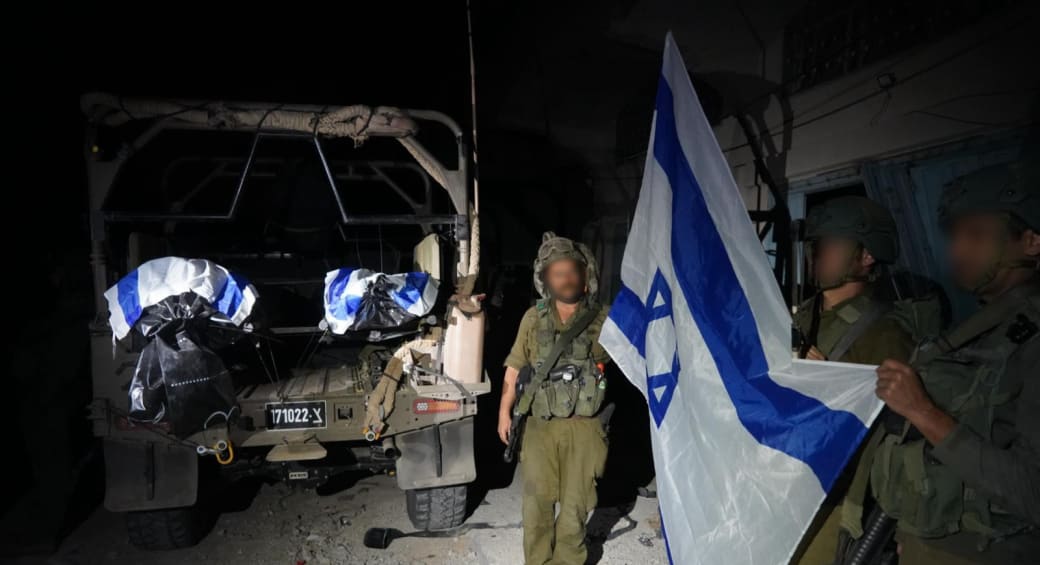

IDF begins pumping seawater into Hamas tunnels in Gaza -WSJ
In 2015, Egypt flooded tunnels between the Gaza Strip and the Sinai Peninsula with seawater.
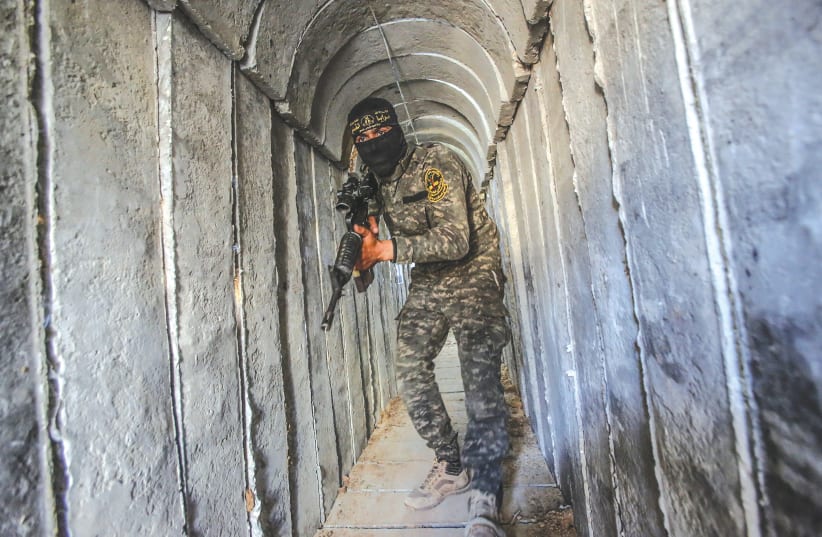
The IDF has begun pumping seawater into Hamas' tunnel complex in Gaza, the Wall Street Journal reported on Tuesday citing unnamed US officials, adding that the process would likely take weeks.
Some Biden administration officials have said the process could help destroy the tunnels, where Israel believes the terrorist group is hiding hostages, fighters and munitions, the Journal reported. Other officials have expressed concerns the seawater would endanger Gaza's fresh water supply, the newspaper reported.
Go to the full article >>Israeli Air Force destroys rocket launching site, rockets ready to launch at Sderot

The Israeli Air Force destroyed a rocket launching pad on Monday night while it was launching rockets toward the southern Israeli city of Sderot, the IDF announced on Tuesday.
Soldiers from the Duvdevan Unit raided a building that belonged to Hamas and found 250 rockets, mortars, and RPG missiles. They also found weapons and military equipment in the building. The Givati Brigade destroyed a weapons manufacturing site and found hundreds of grenades, rockets, and anti-tank missiles.
Go to the full article >>Israeli hostage recalls horrors of Hamas's sexual assaults
"We're trying to rebuild something new from the ruins of our lives, but our minds are still with the girls who are left there."
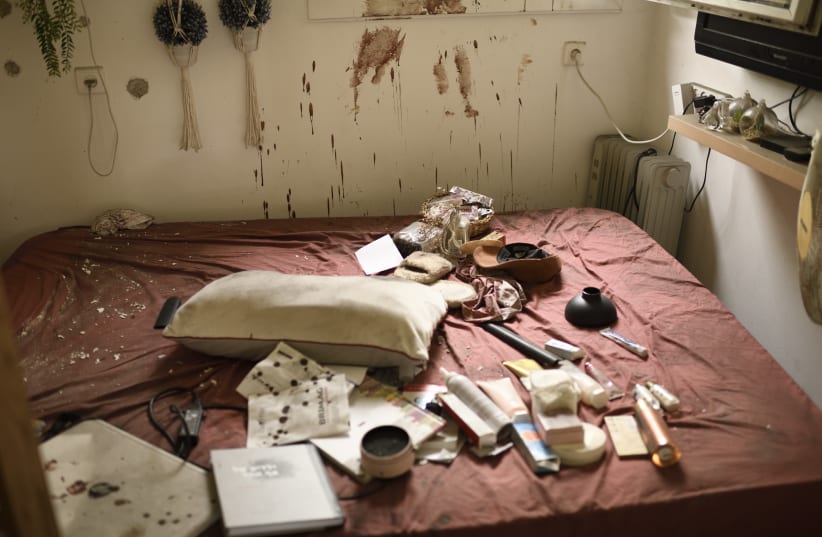
One of the released Israeli hostages said on Monday that 'At least three women were sexually assaulted by their Hamas captors.'
"It was an unprecedented situation," Chen Goldstein-Almog, a released hostage, recounted on Monday, after being freed from Hamas captivity, where she was held along with her three children.
"We assumed that Israel would refrain from any military action. That they would first ensure our safe release and then comply with the captors' demands. However, as days passed, we realized the complexity of the situation. The escalation of air force strikes made us fear that we were being sacrificed for greater strategic purposes."
Look at them.
— Yonatan Gonen (@GonenYonatan) October 28, 2023
Almog-Goldstein family.
On the 7th of October Hamas terrorists infiltrated their home in Kibbutz Kfar Aza in southern Israel and unleashed a brutal and murderous attack.
Nadav, the father, was murdered.
Chen, the mother, was kidnapped to Gaza.
Yam (20) was… pic.twitter.com/dN7owMDf8U
"We heard three firsthand accounts and another story that was relayed to us," she continued, "about incidents that occurred a few weeks after our stay in Gaza. These women were physically harmed. The way they were sexually abused and their bodies violated leaves them unsure of how to cope. If they had been released earlier, they might have been spared from this trauma. We also saw a young man who was beaten."
Regarding the kidnapping, she detailed how she and her children quickly understood that Nadav, the family's father, and their eldest daughter, Yam, had been killed in their home.
"Some of us were turned away, but we all passed him as he lay there, and we never left his side. We realized the gravity of the situation en route. When they took us, I told my children, 'Yam is certainly no longer with us.' And Nadav too, it was a point-blank shot to the chest. It turns out they were left in the house for several days before they could be retrieved." In captivity, "we later found out that it wasn't just one of our guards, but several, who had raided our home."
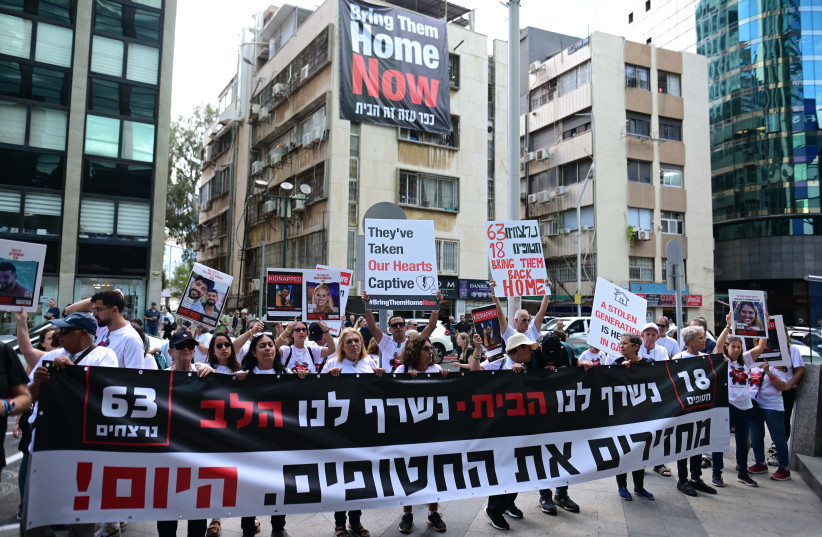
Family was moved around due to strikes on Gaza
She mentioned that she and her children were never separated: "We were always together. There was more emotional repression during our time there. Our freedom was restricted, meals were infrequent, and at times, we experienced hunger."
"We spent a month and a half in a central apartment with a telephone line," she described their place of captivity, "then there was a sort of loss of control. We felt their helplessness too. The attacks increased to the extent that the buildings we were in suffered damage. This led to a more intensive shuffling of our locations."
Chen testified about being taken aback: "I was amazed by the composure of my children on the day we were captured, and their resilience throughout the ordeal."
What surprised her, she explained, was "the confidence with which they communicated with our captors in Hebrew. They learned many words in Arabic. They wrote and drew extensively. A lot of materials accumulated, and they said they would bring them to us, but they never did."
She recounts a singular instance of intimidation: "There was one threat when something about the way I was moving around, or rather too freely, in the first apartment we were taken to, seemed off to them. There was a looming threat that I might be harmed, but it never materialized. That was the only time I felt threatened in such a manner."
Sharing her thoughts on their release, she says, "It took two to three days after we were told 'today you are on the list' for our release to actually happen. The girls with us rejoiced for us, and we were overjoyed too, but it was a cautious happiness. Until we truly left, we didn’t allow ourselves to be too happy, to avoid disappointment. We endured many disappointments throughout our captivity."
Reflecting on the aftermath, she says, "I am still processing everything. I'm here in the present, overwhelmed with thoughts about what we went through and those who remain behind," she states, "We're trying to rebuild something new from the ruins of our lives, but our minds are still with the girls who are left there. Two weeks have gone by, and they are still there."
Sharing more, she says, "The girls who were with us entrusted us with numerous messages for their families. I’m certain they are struggling with the difficult emotions of still being left behind. We hoped that the girls who remained would be released a day or two after us. Hanukkah came, and they are still not here, which is disheartening, frustrating, and infuriating."
On the subject of the remaining captives, she asserts, "Everything possible must be done to rescue them. The women, the injured women, the female soldiers, the civilian boys, the soldiers, the adults. All of them must be brought out. They must not be broken by this ordeal. They face daily dangers and are in dire need of both medical and psychological care."
Go to the full article >>Tehran warns of ‘explosion’ if war continues
‘The only things Iran and Israel have in common – we don’t believe in two-states’
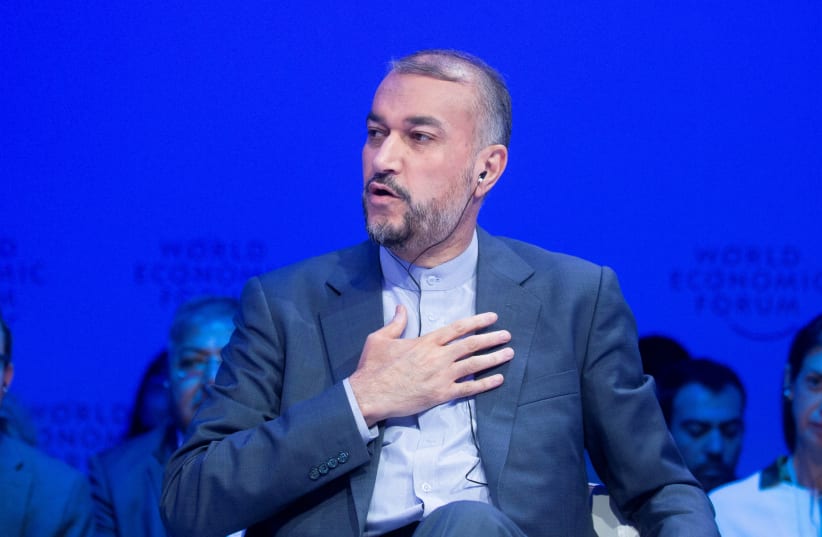
The continuation of the Gaza war will lead to a regional explosion, Iranian Foreign Minister Hossein Amirabdollahian told the Doha Forum on Monday, as he explained that the scope of the conflict had already expanded to include Lebanon and Yemen.
“At any moment there is a possibility of a big explosion in the region, one not controllable by any party,” he said as he spoke through an English language translator in a virtual interview conducted by CNN’s Becky Anderson.
The foreign minister pointed to attacks against US bases in Iraq and Syria, Houthi attacks on ships in the Red Sea, and the violence on Israel’s northern border as proof that regional violence had expanded beyond the Gaza border.
“At least every week, we receive a message from the US telling us that US bases in Syria and Iraq are targeted by some groups,” Amirabdollahian said. These groups are “defending the Arab and Muslim people of Gaza; that is why they are targeting US bases in Syria and Iraq.”
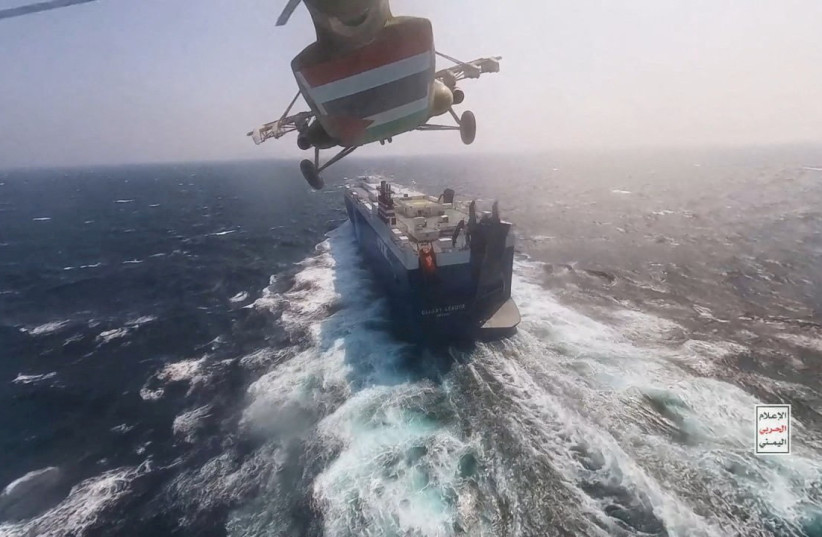
Israel, which he said is essentially a US regional proxy that cannot be considered a state, cannot defeat Hamas even if it fights them for the next 10 years, Amirabdollahian said.
Hamas is ready to fight for years and can produce and procure weapons, he explained.
Iran has supported Hamas’s October 7 infiltration into southern Israel, in which the terror group killed at lest 1,200 and seized some 250 hostages.
The Iranian foreign minister said the attack was the direct result of the creation of Israel 75 years ago, as he explained that the territory within its borders was considered to be occupied Palestinian land.
“We do not recognize Israel as a government. It has just been an occupying power for 75 years,” Amirabdollahian said as he called on the US to “abandon their unconditional and unwavering support for Israel.”
"Liberation movement"
Hamas is “a liberation movement against” that occupation, he said. Iran supports “resistance groups” such as Hamas working to free Palestinian territory, he explained, adding that this also included Hezbollah and Islamic Jihad.
He accused Israel of using disproportionate force in Gaza, pointing to the Hamas figures of 18,000 Palestinian fatalities as a result of the war. Israel has said that at least 7,000 are Hamas fighters.
In discussing the Israeli-Palestinian conflict in general, Amirabdollahian said that the best resolution would be to put a referendum before the Jewish, Christian, and Muslim residents of that territory asking what they believed the resolution should be.
But he clarified that Iran does not believe in a two-state resolution to the Israeli-Palestinian conflict – and neither, he said, does Israel. Tehran wants to see a Palestinian state on all that territory and Prime Minister Benjamin Netanyahu wants it all to be part of Israel, he said.
“The only thing we have in common is that neither of us believes in a two-state solution.”
Amirabdollahian accused Israel of wanting to forcibly displace Palestinians in Gaza to Egypt and those in the West Bank to Jordan.
Iran has also not supported normalized regional ties with Israel, he explained.
“Israel has been acting against the interest of the region. We have given documents to some of these countries that normalized ties, to show them that Israel is not their friend, but is their enemy.”
Reuters contributed to this report.
Go to the full article >>Israel security chief in letter to the world: 'Do not interfere'
The letter of the head of the Shin Bet to the UN Secretary-General reflects the frustration among decision-makers in Israel, from the international indifference to what happened on October 7.
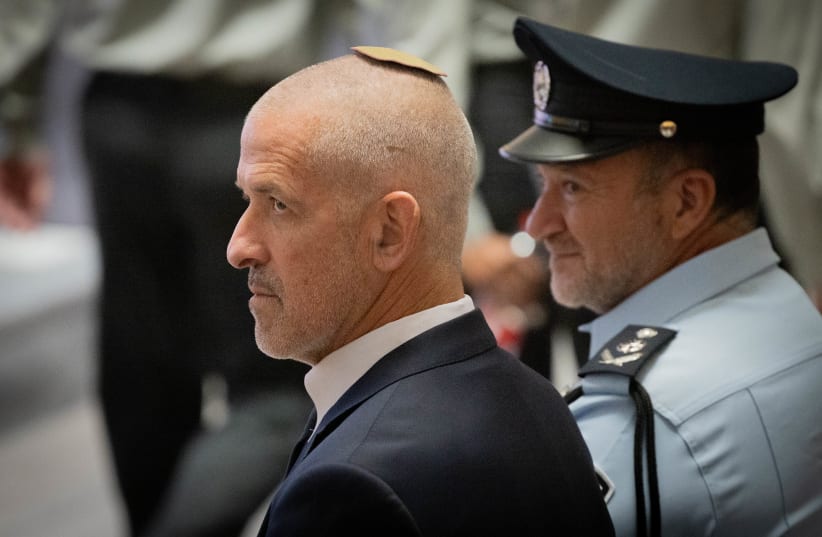
Last month, Shin Bet (Israel Security Agency) chief Ronan Bar addressed a long and poignant letter to UN Secretary-General Antonio Guterres, in which he wrote, among other things "We are determined to complete our mission in Gaza. All those who aspire to see a safer world should refrain from interfering or stopping us."
He added "The UN Charter states that the goal of the organization is to 'renew belief in the most basic human rights, in human dignity and the importance of human life, and the equality of rights between men and women.' Hamas has ruled the Gaza Strip for 17 years and grossly ignores these principles, and the needs of the 2.2 million citizens living in Gaza."
"During the activities of Hamas on October 7, there was no respect or rights whatsoever. The UN was founded to ensure that 'never again', anywhere in the world. But on the day of the massacre in October, it returned in full force. Jews were brutally murdered, just for being Jews. The IDF is an army that operates in accordance with the highest moral principles. We do not act deliberately against civilians."
"Reality forces us to act in a civilian environment. We are forced to do this by a terrorist organization that acts as a sovereign on the ground and kills civilians, Israelis, and Gazans alike, from the first day it was founded. This is the time to remind you, Mr. Secretary-General, that Yahya Sinwar himself was sentenced to 5 life sentences in Israel for murdering Palestinians, not Jews. Gaza should be freed from Hamas, not from Israel. Hamas is ISIS."
Ronen Bar continues, writing "Out of respect for the thousands of lives that have already been lost, and in order to save many more lives, please help us remove the rule of evil from the Gaza Strip and restore faith in the most basic human rights, human dignity and the value of human life, as written in the UN Charter. Help us restore the belief in equal rights between men and women, Palestinians, Israelis, Muslims, Christians, Jews, and others. Help us bring back our fathers and mothers, our brothers and sisters, back home."
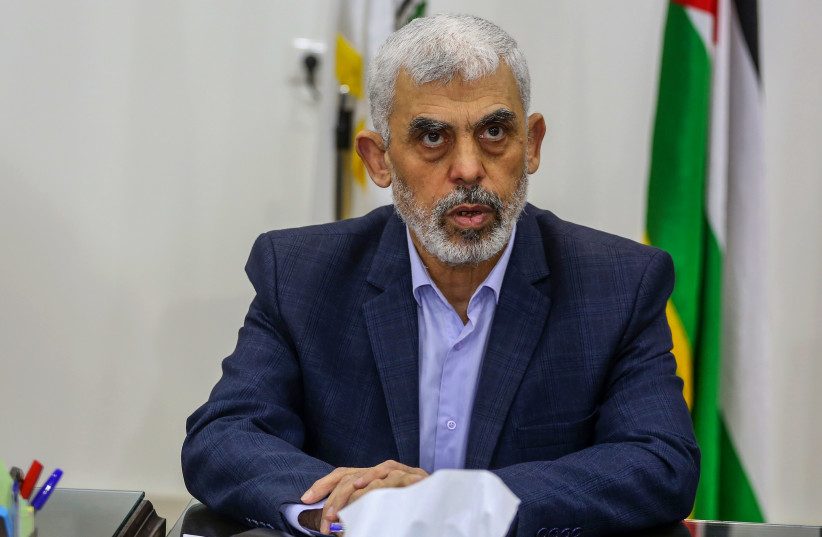
"Help us bring our grandparents back home. Help us save our babies and return them to their families, to begin healing our wounds (at the time the letter was sent to the UN Secretary-General, most of the children held by Hamas had not yet been returned. Even now, the 10-month-old baby Kafir Bibs and his brother Ariel, 4 at the hands of Hamas, which claims that they were killed)".
At the beginning of his letter, Bar mentions that a few months ago he arrived at the UN building for a meeting that was supposed to take place with the Secretary-General, but in light of his absence, it was finally held with his deputy, Dr. Asha-Rose Migiro. Bar wrote to Guterres that in that meeting he described to the Deputy Secretary-General the tense situation in the Middle East, especially around Lebanon, the West Bank, and Gaza. "I emphasized to her," writes Bar, "the risks of breaking out into a multi-arena conflict, and perhaps even a global one, in light of the great tension between the powers."
"I asked her that the UN strengthen the stabilizing factors in the area and help neutralize the factors that cause instability. Among other things," Bar writes, "I mentioned the leader of Hamas, Yahya Sanwar, and the need to put pressure on him to order him to return the bodies of our fighters and Israeli civilians in his hands. I emphasized the need to solve the problem of arms smuggling to Gaza, and the problem of the dual use of materials that are transferred from Sinai to Gaza, and you asked for the help of the UN on these issues."
UN did not answer his requests
"Unfortunately," concludes Bar, "none of these requests of mine were answered, and what did happen is what we all feared would happen. At this point, Bar harshly criticized the words of the Secretary-General himself: "I heard your statements regarding the recent events in Israel and Gaza, You set up a symmetry between the acts of cruelty and the violation of human rights between Israel and Hamas, and nothing could be further from the truth. Crimes against humanity and war crimes were committed against Israel, Israelis, and other nationalities. Additional war crimes were committed when Hamas shot and injured civilians who tried to leave the northern Gaza Strip, after its warnings. of Israel, and refused to be a human shield in the service of Hamas."
"War crimes were committed when Hamas used hospitals as combat headquarters and humanitarian aid as a cover for terrorist operations. The attempt to create a moral parallel between the terrorists of Hamas and the defense forces of the IDF is wrong and repulsive on a moral level. There is no way to balance when you compare acts of murder and torture of children and babies to the unfortunate but necessary suffering of civilians who are cynically used by Hamas as human shields. Hamas exploits the citizens of Gaza for its manipulative needs and its public relations."
"The world," Bar wrote, "must understand that on October 7 the reality of the free world changed dramatically. We have clear evidence proving that the crimes against humanity, brutally committed by Hamas, were part of its operative plan. On that black Sabbath, the thousands of Hamas terrorists did what their leaders ordered them to do: they raped our wives and daughters, strangled our babies, and burned our houses with entire families inside. They tortured mothers in front of their children, and children in front of their mothers."
"After them, came hordes of rioters who sowed destruction and death in our quiet communities. The perpetrators of these crimes do not belong to the human race and are not human. This is not a war about ideology or religion, it is a fight between the good and the bad. Israel stands on the first line, as the last line of defense for the defense of the free world, standing between darkness and light, between barbarism and humanity. We are the protective layer between those who mourn death, and those who worship it."
The extraordinary letter of the head of the Shin Bet to the UN Secretary-General reflects the frustration among decision-makers in Israel, at all levels, from the international indifference to what happened on October 7, in the face of the growing identification with the suffering of the Palestinians in Gaza. The words reached their peak in the statements of the President and the presidents of the leading universities in the USA according to which calling for the genocide of Jews does not constitute a violation of the rules and regulations of their institutions, and the belated and lax condemnation of the United Nations Women's Organization for the terrorists' acts of rape, murder and abuse of Israeli women.
In the talks held by Israeli political parties with foreign leaders, diplomats, and public opinion leaders, it was said that Israel has a severe "credibility problem" in the world, which is compounded by a general ignorance regarding the nature of the conflict in the Middle East and manifestations of new and old antisemitism, especially among the younger generation.
Go to the full article >>IDF, Shin Bet chiefs meet in Khan Yunis
Rockets pound center as IDF invasion death toll passes 100.
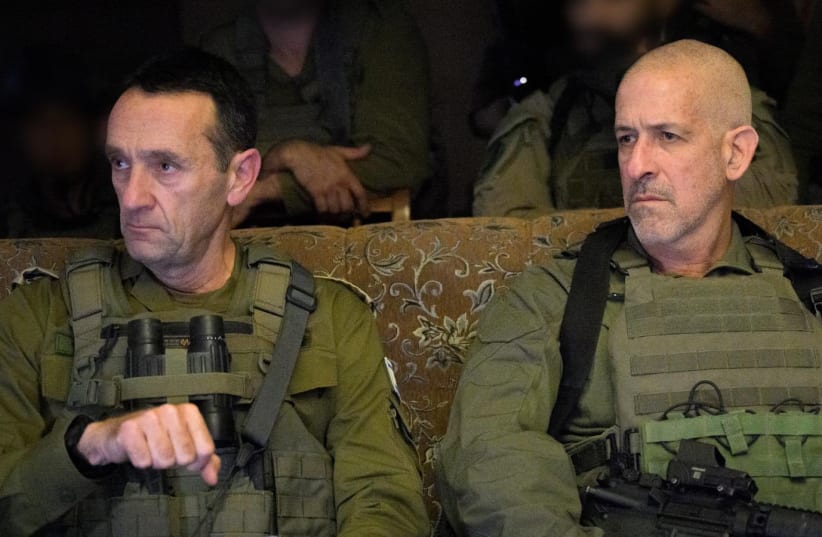
IDF Chief-of-Staff Lt.-Gen. Herzi Halevi and Shin Bet (Israel Security Agency) Chief Ronen Bar met in Hamas’s southern Gaza capital of Khan Yunis on Monday night to demonstrate IDF progress.
Halevi said, “we are deepening our gains in northern Gaza, the South, and underground.”
Bar stated, “There is no force which can stand up to the combined force” of the IDF soldiers and the Shin Bet combat forces.
In a meeting in Khan Yunis with the two chiefs, IDF Southern Commander Maj.-Gen. Yaron Finkleman, the Division 98 Commander and the IDF Commandos chief all provided the latest updates on Israeli forces in the South, now eight days into the southern operation.
In addition, the IDF said that more than 500 Palestinians have been arrested over the last four weeks and have been taken to be interrogated by the Shin Bet and IDF intelligence Unit 504.
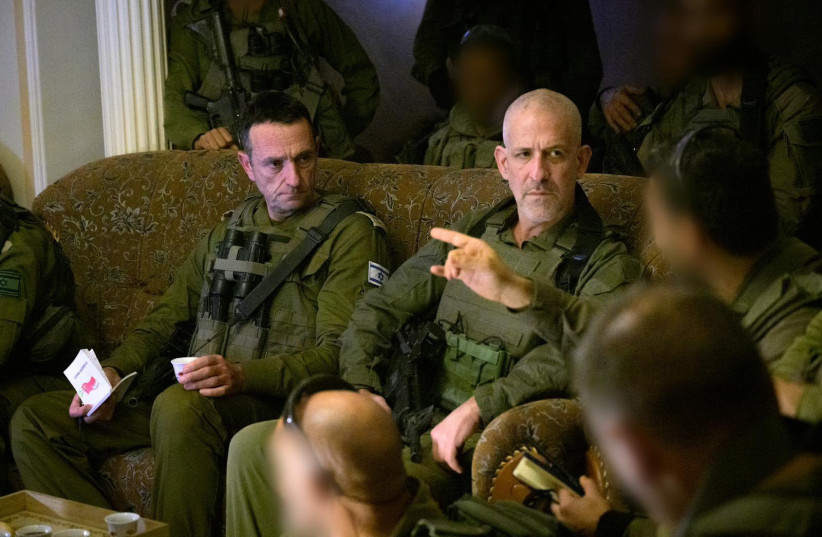
Among them are 350 from Hamas, and 120 from Islamic Jihad.
"Making progress in battle"
At a Monday night press conference, Defense Minister Yoav Gallant said, “we are making progress in battle and deepening our achievements.”
Gallant spoke directly to Hamas Chief Yahya Sinwar, telling him either to surrender or face death on the battlefield.
He said that Hamas terrorists in Jabalya and Shejaia are being brought down, even though they had thought they were unbeatable. “They are on the verge of falling apart,” he said.
Next, he said that Hamas forces who surrender are saying they do not have enough ammunition or food.
Gallant noted that many of those surrendering were involved in the October 7 massacre.
Questioned about a security zone around Gaza, Gallant responded that anything which serves the military campaign is something Israel needs to do, and that the fighting will not be short. On the flip side, the defense minister said, “there is no intent to stay permanently in the Gaza Strip.”
Further, he added that IDF commanders are taking big risks in a variety of strategic directions to save the lives of Israeli hostages being held by Hamas.
Pressed as to whether the US is setting a deadline for Israeli operations, he replied, “The war will end when its goals are achieved… I take with seriousness what America does… and we will find a way to help the US to help us.”
IDF death toll passes 100
Despite Israel’s ongoing albeit slow progress, Hamas managed to fire a barrage of rockets on Tel Aviv and the country’s center as the IDF announced on Monday that its death toll of fallen soldiers since the invasion had crossed the 100 mark, reaching 103.
Although rockets fired from Gaza at Israel, and especially at Tel Aviv and other central areas, have dropped dramatically to around 40 sirens per day as compared to the start of the war, the Gaza terror group has maintained its capability to reach sensitive parts of the country.
Three soldiers – IDF Maj. (res.) Roman Bronshtein, 46, Cpt. (res.) Eliya Yanovsky, 24, and Master-Sgt. Ari Yehiel Zenilman, 32 – fell in battle in the southern Gaza Strip on Sunday, the IDF Spokesperson’s Unit said Monday afternoon.
The IDF had already announced the names of four more fallen soldiers on Monday morning.
One of them, Warrant Officer (Res.) Gideon Ilani, 35, of Asael, fought in the 2855th Battalion. Ilani was killed in battle in Gaza.
Two soldiers fell fighting in the 8111th Battalion in southern Gaza: Warrant Officer (Res.) Etay Perry, 36, from Modi’in; and Major (Res.) Eviatar Cohen, 42, from Kfar Saba.
Lastly, Major (Res.) Gal Becher, 34, of Oranit, an instructional officer in the 36th Brigade, was killed in a military road accident in southern Israel.
Some of the soldiers died in an ambush near a tunnel in southern Gaza.
They were killed after IDF forces thought they had cleared the area of Hamas, but it appears that a lookout from another area may have remotely detonated an improvised explosive.
Meanwhile, a Hezbollah MP warned that Israeli airstrikes that caused widespread damage in the town of Aitaroun near the Israeli-Lebanese border on Sunday were a “new escalation,” adding that the terrorist group would continue its attacks on Israel, in a statement to Reuters.
Hassan Fadlallah warned that the terrorist movement would respond to the “escalation” in new ways, be it “in the nature of the weapons [used] or the targeted sites.”
Lebanese media portrayed the IDF’s response to Hezbollah attacks on Sunday as a significant escalation compared to other clashes along the border in recent weeks.
On Monday morning, at least six rockets were fired from Lebanon toward northern Israel and were intercepted by the Iron Dome, according to the IDF Spokesperson’s Unit. The military responded with artillery fire and multiple rounds of airstrikes targeting several locations along the Lebanese border.
Additionally on Monday, Lebanon’s Nidaa al-Watan newspaper reported that a gradual escalation had been taking place in recent days, coinciding with a demand by Israel that Hezbollah withdraw to north of the Litani River in Lebanon in accordance with UN Security Council Resolution 1701.
The Nidaa al-Watan report noted that the strike on Aitaroun was the first in which “an entire neighborhood has been destroyed in a southern town,” saying that this raised concerns that “the Gaza war model of widespread destruction... is beginning to rear its head on the Lebanese front.”
IDF sources confirmed that the military has somewhat escalated its attacks and responses in the North.
Gallant said at his press conference that either there needs to be a deal with Hezbollah to move its Radwan and anti-tank missile forces back from the border, or there will be a need for a military operation to move them back.
He added that Hezbollah has lost far more than 100 members of its forces, given that it coordinates with other terror groups and is excluding losses of those terror groups from its public numbers.
Questioned as to whether the IDF had used white phosphorus in battle in Lebanon, he responded vaguely, “we follow international law.”
Hezbollah announced on Monday morning that two of the movement’s members were killed amid the intensifying clashes.
Last week, Gallant told the leaders of communities near the northern border what he said at his press conference: that Israel was attempting to reach a diplomatic solution in which Hezbollah would retreat to the Litani River, but was also prepared to remove the terrorist group through military means from the area near the border.
During a visit to Israeli forces along the Lebanese border on Sunday, Halevi stressed that security needs to be restored to the northern front, and that “there is a military way to do this, the beginning of which is also what you are doing here—to strike, to deter, to kill Hezbollah operatives, to show our superiority—and it can also come in the form of an offensive, an attack and a war.
“The State of Israel has never gone and said war is the first solution we will try,” he said, “but we understand that the current situation should end with a very, very clear change.”
Ali Damush, the deputy chairman of Hezbollah’s Executive Council, rejected statements by Israeli officials saying that the group “will not allow the equations to be changed,” with some reports saying that the terrorist group would not withdraw its forces any sooner than the IDF would move its forces back to Haifa.
On Sunday, the United Nations Interim Force in Lebanon said that a watchtower inside a UNIFIL position near Ibel Qameh in the country’s southern region was hit by shelling on Saturday afternoon. No injuries were reported in the incident.
“Any targeting of UNIFIL positions and any use of the vicinity of our positions to launch attacks across the Blue Line is unacceptable,” the interim force said. “After over two months of active shelling along the Blue Line, the potential for a miscalculation that could trigger a wider conflict is increasing.”
Go to the full article >>Biden alludes to disagreements with Israel's Netanyahu
Biden, speaking at a White House reception for the Jewish Hanukkah festival, recalled his decades-long relationship with Netanyahu.

US President Joe Biden on Monday alluded to the complex relationship he has with Israel's Benjamin Netanyahu, suggesting the prime minister is in a "tough spot" and that the two have had their share of disagreements over the years and at present.
Biden, speaking at a White House reception for the Jewish Hanukkah festival, recalled his decades-long relationship with Netanyahu.
He noted he made an inscription on an old photograph of the two men, using a nickname for the Israeli leader.
"I wrote on the top of it, 'Bibi I love you but I don't agree with a damn thing you had to say.'"
"It's about the same today," Biden said, to scattered applause from the largely Jewish audience, adding that Israel is in a "tough spot" and that "I've had my differences with some Israeli leadership."
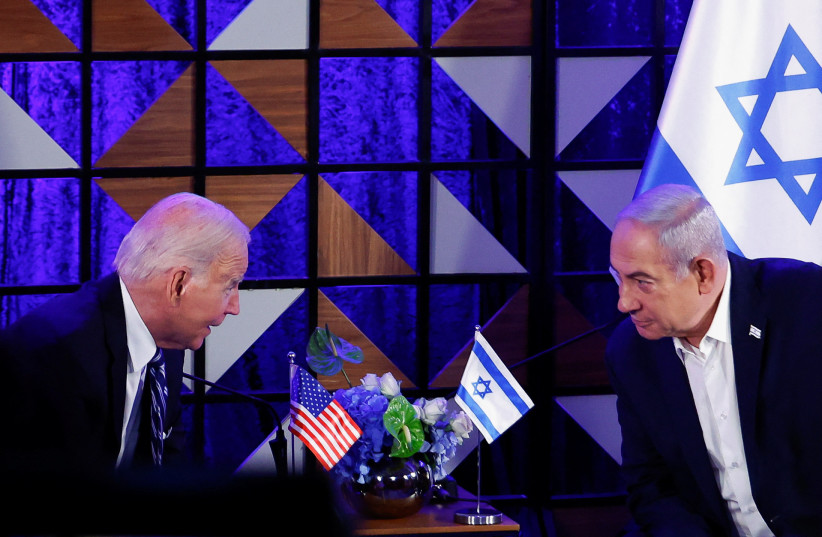
He did not elaborate on what differences between the two men remained, though in recent weeks they have included issues spanning the current war against Hamas and treatment of Palestinians.
Biden's continued support for Israel
Biden has weathered intense criticism for his support for Israel's response to Hamas's Oct. 7 cross-border attack, when the militants killed 1,200 people and took 240 hostage, according to Israeli tallies. About 100 hostages have since been freed.
Israel's retaliatory assault has killed 18,205 people and wounded nearly 50,000, according to the Gaza health ministry, drawing sharp rebukes within the United States.
Biden told Jewish people celebrating the holidays at the White House that, differences with Israeli leadership aside, his "commitment" to the "independent Jewish state is unshakeable."
He added: "Folks, were there no Israel, there wouldn't be a Jew in the world that was safe."
He said assistance to Israel would continue until Hamas was routed out but warned that public opinion could shift in grave ways for Israel's security.
"We have to be careful," Biden said. "They have to be careful. The whole world's public opinion can shift overnight. We can't let that happen."
Biden said the United States would continue to work to free hostages still held in Gaza, speed humanitarian aid to Palestinians and "emphasize to our Israeli friends we need to protect civilian life."
Go to the full article >>Water shortages, soil contamination: Hamas war puts environment at risk
The contamination poses a potential threat to agriculture, as these toxins can infiltrate and adversely impact farming practices.
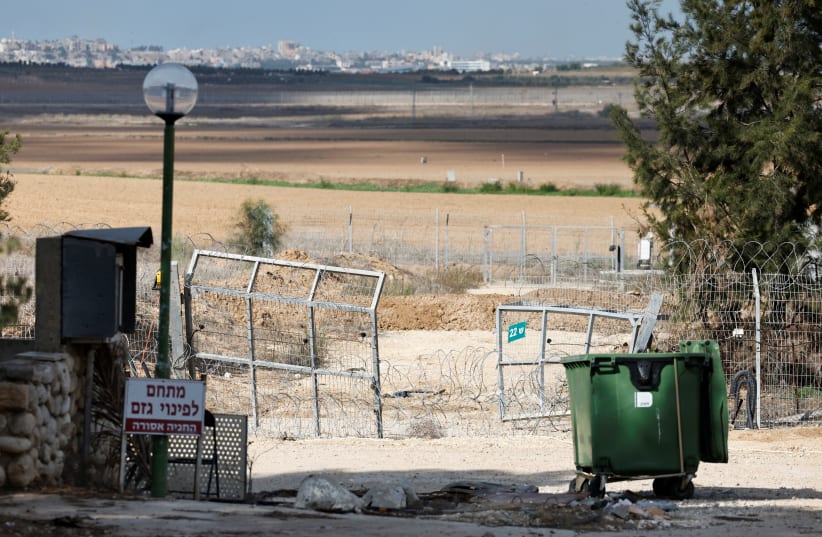
The Israel-Hamas war that started on October 7 carries with it the potential dangers to the country's environment and public health, as well as community resilience, according to a team of experts from the Taub Center for Social Policy Studies in Israel.
"While we think that the most important issues today are winning the war and bringing our hostages home," said Maya Sadeh, who led the research with Dr. Rakefet Shafran-Nathan, "we think it is important to understand the environmental impact."
Sadeh said that the 21-page study, raising concerns about the war's impact on water, energy, fuel, hazardous materials storage, food security, air pollution, and nature and wildlife, is meant to capture the attention of Israeli policymakers and the public. The objective is to highlight potential hazards in these domains, emphasizing the possible risks to public health and resilience of the Gaza border area population.
Drinking water
"Drinking water is a strategic resource in wartime," the researchers said. However, Israel cannot guarantee at least 2 million residents and 30% of the country's hospitals clean water during an emergency.
Israel has grown dependent on desalinated water and, therefore, neglected water supply from wells, including 500 inactive wells that have been closed due to pollution with no attempt at rehabilitation.
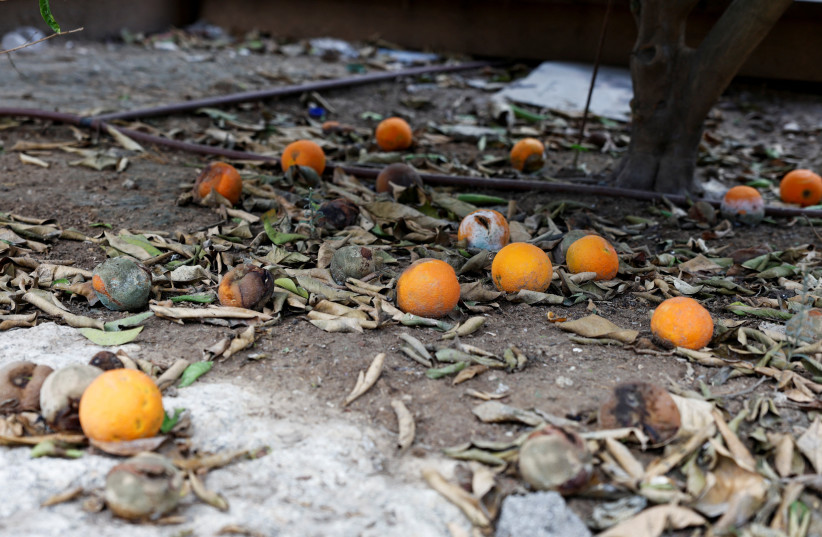
"These water sources should be available in emergencies, when it may not be possible to desalinate water," the researchers said, noting that since October 7, there has been a "fear of a shortage of chlorine necessary to purify drinking water."
Furthermore, the breakdown in the sewage treatment facility in Gaza exacerbates the situation. The untreated sewage flows into the Mediterranean Sea and from there to the coast of Israel, particularly the beaches of Ashkelon and Zikim.
"The flow of untreated sewage to the beaches may lead to an infestation of flies and mosquitoes and to diseases that spread through physical contact or bathing in water that is polluted with pathogens," the researchers said, adding that "excess biological material in the water also adversely affects the quality of water or the consumption of energy by the desalination facilities along the coast."
Sadeh explained that sewage can be contaminated with infectious agents that may cause diseases in Gaza because of sanitary conditions. These diseases could spread to soldiers fighting in the enclave and make their way to Israel.
Food security
The flight of thousands of foreign workers from Gaza and northern border communities and the displacement of tens of thousands of residents, many of them farmers, could harm Israel's fresh food supply, the study showed.
For instance, in peaceful times, farmers in the Gaza area contributed 70% of Israel's tomato production and 35% of its potato output. Their output has decreased due to the challenge of replacing workers who left, leading them to seek assistance from local and international volunteers. Moreover, the Iron Dome system, designed to intercept missiles, doesn't protect farmland -- "open spaces" -- leaving fields vulnerable. The recent barrage of thousands of rockets has inflicted severe damage on agriculture in Israel's periphery.
The study also revealed that military staging areas and fires have contributed to dirt and dust, negatively impacting cotton cultivation in Israel's south, where approximately 5.7% of the land in the Gaza border area is dedicated to growing cotton.
Additionally, the war has inflicted considerable economic harm on dairy farms in the region, which generally supply milk to all of Israel's dairy manufacturers. This includes damage to livestock and the physical infrastructure.
Looking toward the North, 70% of the country's chicken coops, contributing to 73% of the national output, are situated in the Galilee and Golan. Furthermore, 26% of deciduous and subtropical fruits, such as avocados, wine grapes, mangos, peaches, bananas, and citrus fruits, are grown in the regional authorities along the northern border.
The region encompassing the dunes adjacent to Nativ Ha'asara and Zikim, the Maktesh Reserve in Be'eri, and various open spaces and nature reserves along the border have experienced adverse effects due to the conflict. According to the research, extended military operations are expected to result in soil contamination by toxic metals, including lead, arsenic, mercury, and copper, along with the presence of fuels and other organic compounds.
The contamination poses a potential threat to agriculture, as these toxins can infiltrate and adversely impact farming practices.
"Before any rehabilitation of the area, it will be essential to survey the status of the land for signs of pollution, and, if necessary, purify and rehabilitate it," the researchers said.
The large-scale activity of bulldozers and armored vehicles also endangers the natural habitats of plants and animals unique to dune environments.
Hazardous materials
There are 3,700 stores of hazardous materials in Israel. More than 3 million Israelis live in areas where they could be susceptible to a hazardous material leak as a result of war, according to the study.
In May 2021, a storage unit owned by the Energy Infrastructure Company was struck by a rocket, igniting a fire that persisted for several days. The result was severe air pollution that caused residents to complain of unpleasant odors, irritated eyes, and respiratory challenges.
The report said six out of nine firefighting stations with hazardous material units do not meet the firefighter training standards for dealing with hazardous materials events. Moreover, the report found that the response time of those trained units is nearly double the global standard. As such, a hazardous materials event would likely
to endanger human life, destroy buildings and infrastructure, pollute the atmosphere, ground and water, harm agriculture, cause economic damage, and more, they said.
Oil spills
The Ministry of Environmental Protection approved an increase in crude oil being moved through the Gulf of Eilat for local use during the war and for two weeks after hostilities end – whenever that may be.
The researchers said that this decision increases the chances of an oil spill, which would damage the ocean environment, harm tourism, and potentially even require the closure of the city's desalination plant.
"This danger is ever present but is especially serious under the current conditions of rocket fire and unmanned drones fired from Yemen," the authors wrote.
Funding cuts
Finally, funds meant to be used for environmental protection and cleanup and to counter the impacts of climate change have been diverted toward the war efforts. For example, a portion of the residential tax usually earmarked for waste segregation and management was cut significantly.
"At the beginning of November, the government decided to borrow NIS 820 million from the fund to compensate reserve duty soldiers," wrote the researchers. "Apart from the fact that this stands in opposition to the Maintenance of Cleanliness Law, and the funding was not for this purpose, using more than half of the fund for purposes other than its intended use will delay the program's implementation for waste management."
Sadeh said that while people die from war in Israel, a large percentage of deaths in the country are preventable if the government invested more in the environment. She said 74% of carcinogenic substances are emitted from solid waste in Israel, and diverting funds from waste management, even during wartime, could have a negative impact.
"The impact of insufficient investment in civil issues will also cost lives," Sadeh said.
She told the Post that the country does not yet have a good assessment of the environmental damages of the actual act of war – for example, hazardous materials from missiles that may be dispersed in various areas. There are studies worldwide, Sadeh said, that demonstrated that in war zones, there are more hazardous substances in general that may get into the soil and disrupt the food chain or cause other damage.
"To prevent an environmental disaster, the agencies that preserve the environment must be strengthened and allowed to recruit manpower and given authority and budget to advance legislation and to increase routine enforcement," Sadesh concluded.
"In the rehabilitation of the Gaza border area and its redevelopment, special attention should be paid to health and environmental issues, to preserving open spaces, which have tremendous importance in the resilience of residents upon their return to their homes. The rebuilding of these settlements is an opportunity to plan the physical environment and sustainable social and environmental infrastructures."
Go to the full article >>Gallant: Hamas terrorists, including those involved in Oct. 7, surrendering in Gaza
Hamas is crumbling and its last strongholds falling, Defense Minister Yoav Gallant said.
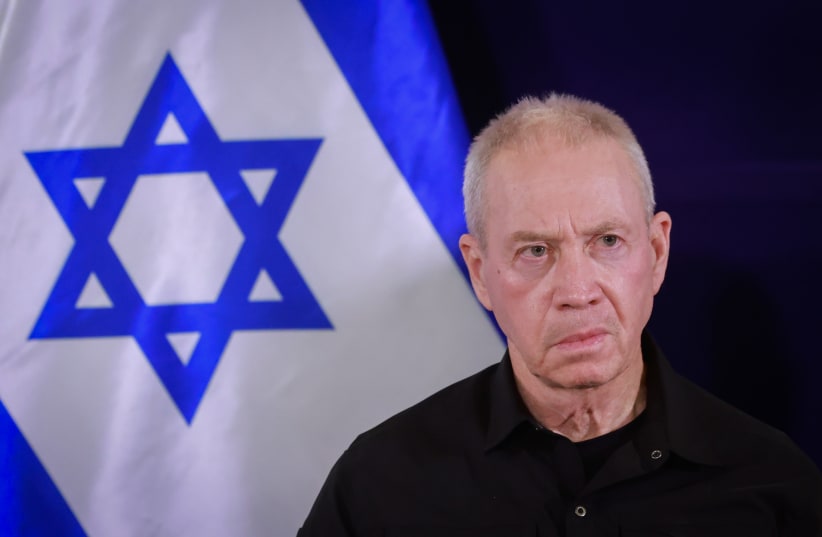
Many of the Hamas terrorists surrendering to the IDF were involved in the October 7 massacre, Defense Minister Yoav Gallant stated on Monday evening during a televised address.
"Hamas is on the verge of dissolution, the IDF is taking over its last strongholds," Gallant said.
He added that Israel has no intention to maintain a permanent presence in the Gaza Strip.
During his address, the defense minister spoke directly to Hamas Chief Yahya Sinwar telling him either to surrender or face death on the battlefield.
He said that Hamas terrorists in Jabalia and Shejaia are being brought down, though they had thought they were unbeatable.
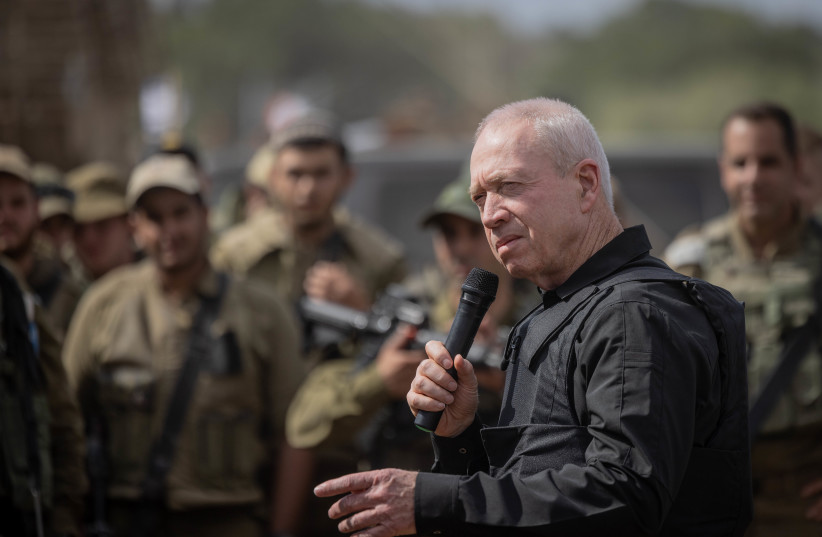
Next, he said that Hamas forces who surrender are saying they do not have enough ammunition or food.
Questioned about a security zone around Gaza, Gallant responded saying that anything that serves the military campaign is something Israel needs to do. The fighting will not be short, he added.
No intention of being in Gaza permanently
Nevertheless, the defense minister said, “There is no intent to stay permanently in the Gaza Strip.”
Further, he added that IDF commanders are taking big risks in a variety of strategic directions to save the lives of Israeli hostages being held by Hamas.
Pressed whether the US is setting a deadline for Israeli operations, he replied, “The war will end when its goals are achieved…I take with seriousness what America does…and we will find a way to help the US to help us.”
Go to the full article >>UNGA to call for Gaza ceasefire as Israel speeds up humanitarian aid
Netanyahu: Hamas wants to destroy us now, PA wants to do it in stages.
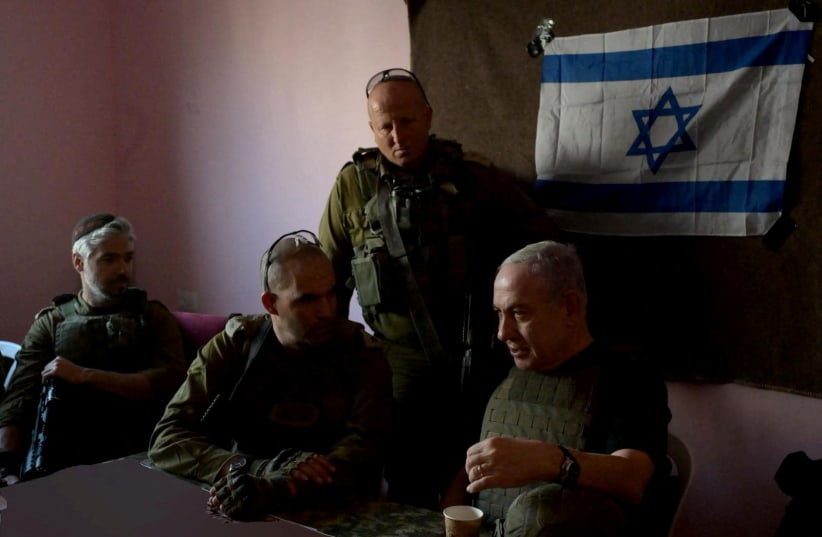
The United Nations General Assembly is expected to call for an immediate humanitarian ceasefire to the Gaza war as Israel plans to speed up the entry of aid into the enclave by allowing trucks to be inspected at the Nitzana and Kerem Shalom Crossing.
“Trucks containing water, food, medical supplies, and shelter equipment will be screened at the Nitzana Crossing and the Kerem Shalom Crossing - and will be forwarded from there to international aid organizations in the Gaza Strip via the Rafah Crossing in Egypt,” the Office of the Coordinator of Government Activities in the Territories (COGAT) said on Monday.
Israel closed Kerem Shalom which is the main commercial crossing into Gaza at the start of the war two months ago. Since then only humanitarian aid has entered the enclave, traveling there through Egypt’s Rafah crossing which is not equipped to handle the needed volume of goods.
“We would like to emphasize that no supplies will be entering the Gaza Strip from Israel and that all the humanitarian aid entering the Gaza Strip will continue to enter via the Rafah crossing in Egypt,” COGAT stated.
Israel facing international pressure
Despite intense international pressure, Israel moved forward with its military campaign to oust Hamas from Gaza following the October 7 attack, in which the terror group killed over 1,200 people and seized some 250 hostages.
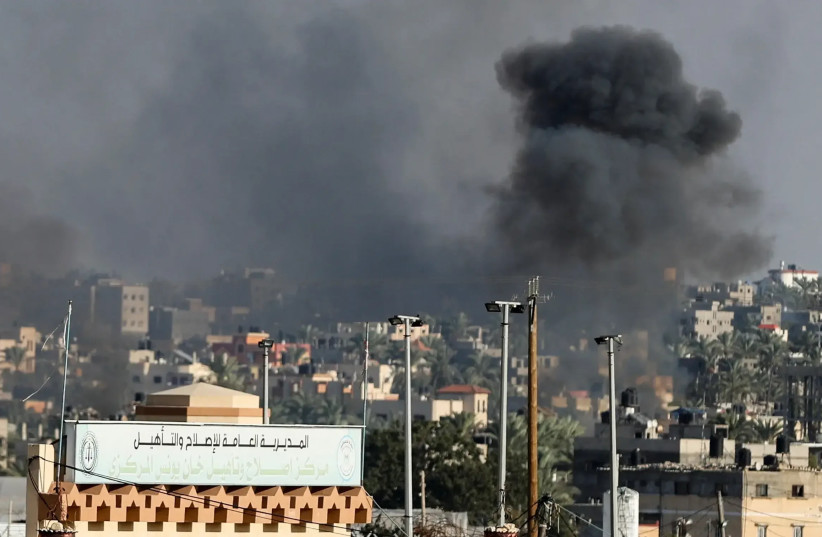
European Union foreign policy chief Josep Borrell told reporters in Brussels that “the destruction of buildings in Gaza was more or less or even greater than the destruction suffered by German citizens during the Second World War” as he called for a ceasefire.
US opposed to ceasefire
United States National Security Council spokesperson John Kirby told reporters aboard Air Force One that the Biden administration opposed a ceasefire that would only benefit Hamas.
But, he said, the US supports additional humanitarian pauses such as the seven-day one Qatar had secured last week in which 105 hostages were freed. The US continues to work for another pause that would allow for more hostages to be freed, Kirby said.
There are “daily conversations” to advance such a pause, he said, amid reports that such a deal could come to fruition next week.
“We want to get those hostages out, we are still working with the Israelis to get humanitarian assistance in,” he said.
The US is also worried about the regional spillover from the Gaza war, Kirby said, as violence continued along Israel’s northern border. “We absolutely do not want to see this conflict spill over into Lebanon. We do not want to see a second front. We do not want to see it escalate and widen,” Kirby said.
In addition, Kirby said, the United States is concerned about reports Israel used US-supplied white phosphorus munitions in an October attack in southern Lebanon.
"We've seen the reports. Certainly concerned about that. We'll be asking questions to try to learn a little bit more.”
Kirby said white phosphorus has a "legitimate military utility" for illumination and producing smoke to conceal movements.
"Obviously any time that we provide items like white phosphorous to another military, it is with the full expectation that it will be used in keeping with those legitimate purposes ... and in keeping with the law of armed conflict," he said.
In Tel Aviv Defense Minister Yoav Gallant responded to a question about white phosphorus in Lebanon, said: "The IDF and the entire security establishment acts according to international law. That is how we have acted and how we will act.”
He also clarified that Israel had no intention of remaining in Gaza once the war was over, although Prime Minister Benjamin Netanyahu has insisted that it must remain under Israeli security control.
In a closed-door meeting, Netanyahu told the Knesset Foreign Affairs and Defense Committee that a civilian administration will operate in Gaza and the Gulf states, such as the United Arab Emirates and Saudi Arabia, will rehabilitate the enclave, according to a report on KAN News.
He pushed back at the Biden administration’s plan to place the Palestinian Authority in Gaza after the war.
"The difference between Hamas and the Palestinian Authority is that Hamas wants to destroy us here and now, and the PA wants to do it in stages,” he said.
In Washington State Department spokesperson Matthew Miller expressed concern about the videos which have been circulated about Hamas terrorists stripped to their underwear and shorts when arrested by the IDF. He also spoke about the importance of Israel complying with humanitarian law, particularly since it receives military assistance from the US.
Miller also told reporters on Monday that US Special Envoy David Satterfield held meetings over the weekend with Israelis asking them to do more on the humanitarian situation in Gaza, where the Hamas-run health ministry said 18,205 people had now been killed and 49,645 wounded in Israeli strikes on Gaza in just over two months of warfare. Israel has said that some 7,000 of those fatalities were Hamas fighters.
UN Security Council envoys spoke of unimaginable suffering and urged an end to the war in the Gaza Strip on Monday as they made an unusual visit to the Egyptian side of the Rafah border crossing.
China's representative to the United Nations, Zhang Jun, asked by reporters if he had a message to nations that opposed a ceasefire in Gaza, said simply: "Enough is enough."
A majority of UN member states support an immediate and lasting ceasefire between Israel and the Palestinian militant group Hamas, which controls Gaza, as dire conditions worsen for its 2.3 million residents.
The United States, which backs Israel, last week vetoed a proposed Security Council demand for an immediate ceasefire as Israeli tanks and troops press an invasion that has displaced most of Gaza's population.
A dozen Security Council envoys attended the trip organized by the United Arab Emirates to visit Rafah, just days after Secretary-General Antonio Guterres warned that thousands of people in the besieged Palestinian enclave were "simply starving."
After flying to the town of Al-Arish they were briefed by UN Palestinian refugee agency UNRWA on conditions in Gaza before heading towards Rafah 30 miles (48 km) away.
"The reality is even worse than what words can speak," Ecuador's UN representative, Jose De La Gasca, told reporters after the UNRWA briefing.
US and France representatives did not participate in the trip.
UAE permanent representative to the UN Lana Nusseibeh said the envoys were told Gazans were dying from malnutrition, a collapsing medical system and a lack of water and food, in addition to the actual conflict in itself.
The vast majority of the Palestinian enclave's 2.3 million people have been driven from their homes.
UNRWA chief Philippe Lazzarini described an "implosion of civil order" where Gazans who have not eaten for days looted aid distribution centers and stopped trucks on roads as they tried to secure supplies for their families.
"There is not enough assistance," Lazzarini said. "Hunger is prevailing in Gaza... Most of the people are just sleeping on the concrete."
Russian envoy Vasily Nebenzia described conditions in Gaza as “catastrophic" and said that those against a ceasefire should “face the reality and afford dignity to the Palestinians."
Nebenzia rejected accusations it was hypocritical to condemn Israel when Moscow had invaded Ukraine.
Limited humanitarian aid and fuel deliveries have crossed into Gaza via the Rafah crossing, but aid officials say it comes nowhere near to satisfying the most basic needs of Gazans.
As the UN envoys traveled towards the Rafah border, hundreds of aid trucks were parked along the road leading to the crossing, waiting to deliver humanitarian aid to Gaza.
UAE's Nusseibeh said Abu Dhabi was coordinating with relevant authorities so that drinkable water could be pumped into Gaza from an Emirati-funded desalination plant in Egypt.
While Israel has turned off the water to Gaza, it is also unclear if Gaza's infrastructure is capable of receiving the desalinated water after weeks of heavy Israeli bombardment.
The UN Office for the Coordination of Humanitarian Affairs said that 100 trucks carrying humanitarian supplies entered Gaza from Egypt on Sunday, the same number as the previous day.
It noted that was "well below" the daily average of 500 truckloads, including fuel, that entered every working day prior to Oct. 7.
The 15-member Security Council is negotiating a UAE-drafted resolution that demands warring parties "allow the use of all land, sea and air routes to and throughout" Gaza for aid.
It would also establish a UN-run aid monitoring mechanism in Gaza Strip. It was not clear when the draft resolution could be put to a vote.
Reuters and Maariv contributed to this report.
Go to the full article >>Israel-Hamas War: What you need to know
- Hamas launched a massive attack on October 7, with thousands of terrorists infiltrating from the Gaza border and taking some 240 hostages into Gaza
- Over 1,200 Israelis and foreign nationals were murdered, including over 350 in the Re'im music festival and hundreds of Israeli civilians across Gaza border communities